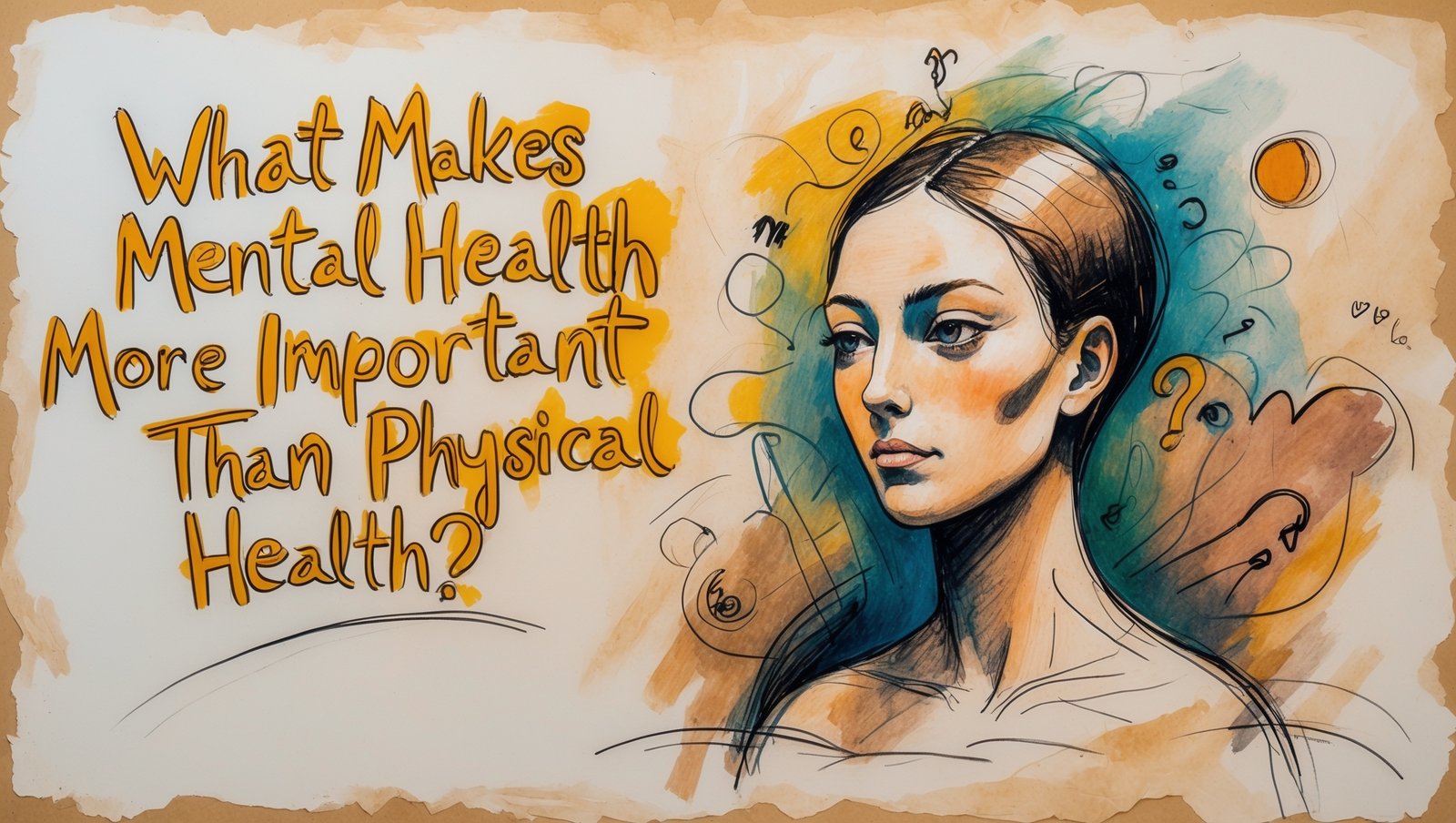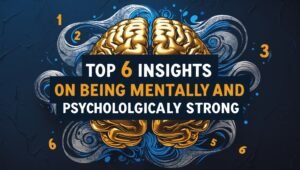Mental health is more important than physical health. But, is it true? Can your mind truly outweigh the importance of your body? For most of us, this idea might seem foreign or even counterintuitive. After all, we’re told that physical health is the foundation for a long and happy life. But when we dig deeper, mental health shows itself to be the unsung hero, guiding how we live, relate to others, and approach life’s challenges. If you think about it, when your mental health suffers, physical health often follows suit, making mental well-being crucial for an overall thriving life.

In this article, we’re going to explore why mental health is more important than physical health, shedding light on the powerful impact that our mental state has on every aspect of our lives.
Table of Contents
The Connection Between Mental and Physical Health
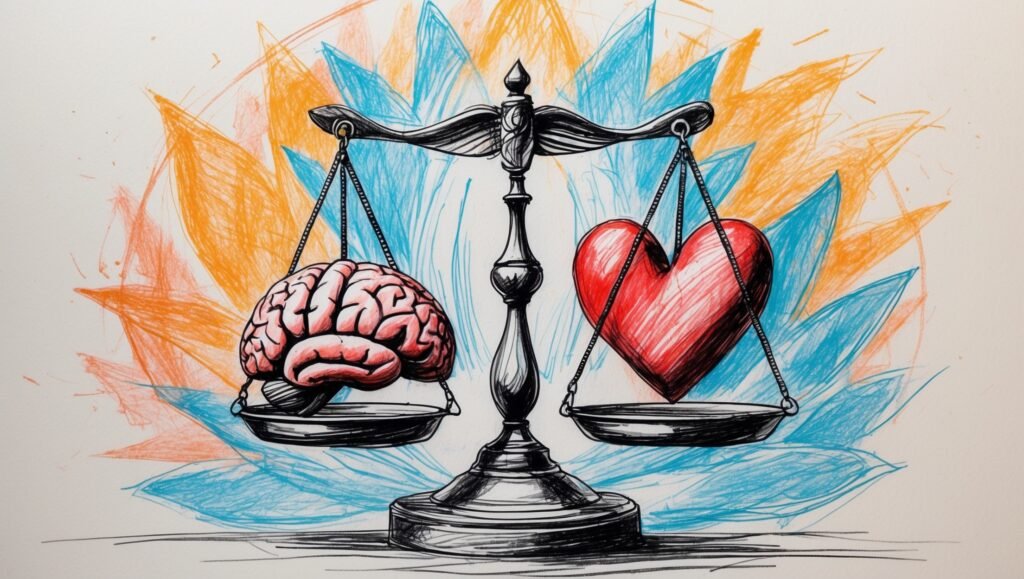
When we think of health, we usually picture a healthy body: strong muscles, a good immune system, and lots of energy. But mental health is just as vital, if not more so. Both mental and physical health influence each other in profound ways. Imagine this: when you’re stressed or depressed, your body feels the consequences—headaches, fatigue, stomach issues, and more. On the other hand, when your body is in pain, it can affect your emotions, leading to feelings of frustration or sadness.
So, it’s not just about your body feeling good or looking good—it’s about how your mind shapes your experience of life. Mental health and physical health work hand-in-hand, each influencing the other like a cycle. When one suffers, the other does, too.
Why Mental Health Is the Foundation of Well-Being
Think of your mental health as the foundation of a house. If the foundation is unstable, everything above it is in danger. Your mental health provides the foundation for your overall well-being, shaping your behavior, decision-making, relationships, and more. When your mental health is solid, you’re more likely to take care of your body, make healthy choices, and engage in life with a positive mindset.
Conversely, when mental health takes a hit, it can lead to physical issues like poor sleep, unhealthy eating habits, and neglect of exercise, all of which can create a vicious cycle.
Mental Health’s Role in Decision Making
Decision-making is something we do every day—whether it’s choosing what to eat, where to live, or how to approach our jobs. If your mental health is in good shape, you’re better equipped to make decisions with clarity and confidence. But when you’re struggling emotionally or mentally, decisions can feel overwhelming, or you may even avoid making them altogether.
Our mental state plays a huge role in how we handle challenges and navigate the ups and downs of life. Poor mental health can lead to poor decision-making, which can, in turn, affect our physical health by leading to stress, bad habits, and a lack of self-care.
How Mental Health Affects Relationships
Our mental well-being doesn’t just impact us; it also affects the people around us. When we’re struggling mentally, it can manifest in our relationships with family, friends, and colleagues. We may become irritable, withdrawn, or anxious, which makes it harder to communicate and connect. On the flip side, when our mental health is thriving, we feel more connected, supportive, and capable of deepening relationships.
In a sense, mental health is the glue that holds relationships together. Without it, our social interactions can break down, causing additional emotional strain.
The Impact of Mental Health on Productivity
Mental health directly influences our ability to stay focused, motivated, and productive. Have you ever tried to work while feeling anxious, sad, or overwhelmed? It’s nearly impossible to focus or perform at your best. When our mental health is strong, we’re better able to handle work pressures, manage our time effectively, and stay motivated to achieve our goals.
It’s no surprise that businesses are starting to recognize the importance of mental well-being in the workplace. A mentally healthy workforce is often a more productive and engaged one.
Emotional Well-Being vs. Physical Illness
While physical illness is something we can see and treat directly, emotional well-being can be more difficult to address. But it’s crucial to understand that emotional well-being is what allows us to handle stress, face challenges, and maintain a positive outlook even when things get tough. Without emotional stability, our immune system can weaken, making us more vulnerable to physical illness.
It’s important to remember that emotional pain can sometimes hurt more than physical pain, and it can have lasting effects on both mind and body.
How Stress Impacts Both Mental and Physical Health
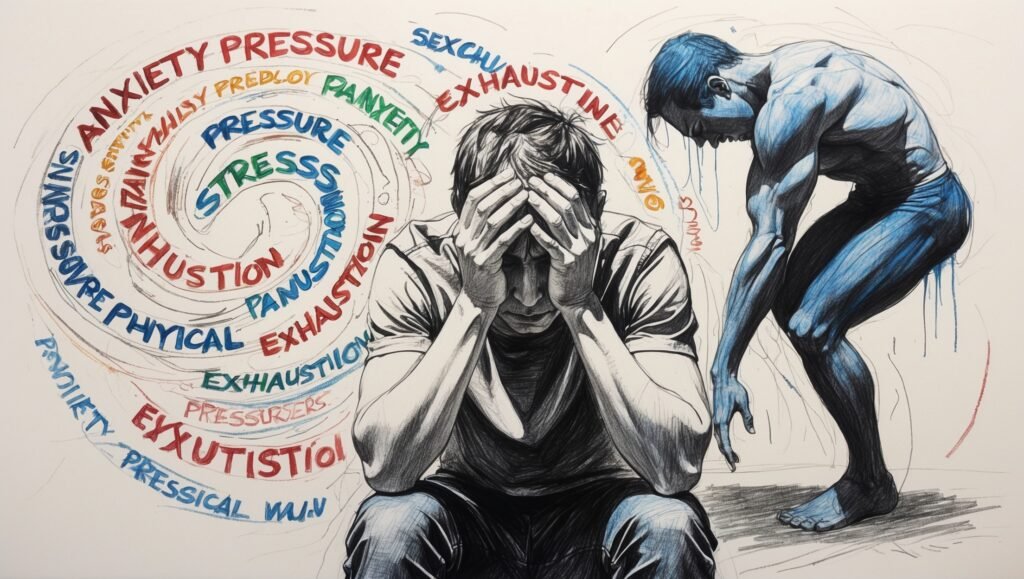
Stress is one of the most common mental health struggles people face today. And it’s a silent killer. When we’re stressed, our bodies release stress hormones like cortisol, which can lead to physical issues like high blood pressure, heart disease, and digestive problems. At the same time, stress can take a toll on our emotional well-being, leading to anxiety, depression, and burnout.
If you’re under constant stress, your body and mind will bear the brunt. It’s a classic example of why mental health is more important than physical health—because stress can destroy both.
The Mind-Body Connection: How Mental Health Affects Your Physical Body
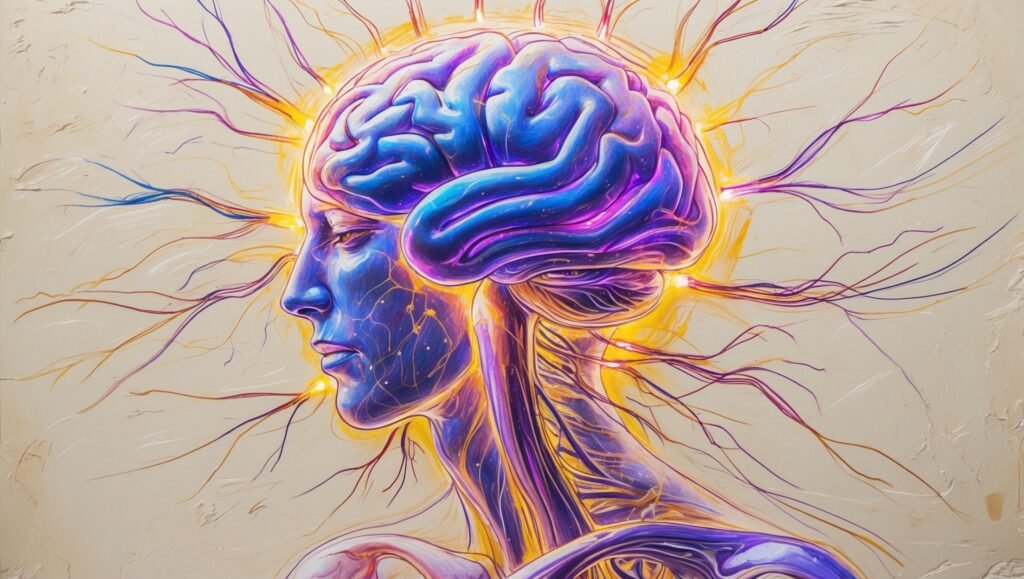
The mind and body are intricately connected. When you’re happy and relaxed, your body mirrors that with a sense of calmness and energy. However, when you’re anxious or depressed, your body shows it—through tension, fatigue, and a lowered immune system. Mental health doesn’t just stay in your mind; it manifests physically, showing just how critical it is to overall health.
The Importance of Mental Health for Self-Care
Self-care isn’t just about bubble baths and skincare routines. It’s about taking care of your mind as well as your body. When we prioritize our mental health, we’re more likely to practice habits that support our overall well-being. Whether it’s talking to a therapist, meditating, or taking time for hobbies we love, nurturing our mental health sets the stage for a fulfilling, healthy life.
Preventing Mental Health Issues
Taking care of your mental health isn’t just about reacting to problems when they arise; it’s about prevention. By fostering positive habits like regular exercise, social connections, and mindfulness, we can build mental resilience. By maintaining mental health, we can prevent physical ailments and keep our bodies strong.
Why Mental Health Is Often Overlooked
Despite the overwhelming evidence that mental health is just as crucial as physical health, it is often neglected. People often overlook mental health issues, fearing stigma or believing they can simply “snap out of it.” It’s time to shift that mindset and recognize the importance of mental well-being, just like we do physical health.
The Role of Mental Health in Achieving Life Goals
Mental health is key to setting and achieving personal and professional goals. A positive mental outlook gives you the strength to overcome obstacles, remain persistent, and keep pushing forward. Without mental well-being, achieving any long-term goal becomes a daunting task. Thus, mental health is more important than physical health when it comes to living a fulfilling life.
How Mental Health Influences Physical Recovery
It’s no secret that recovery from physical illness or surgery is quicker when you have a positive mental attitude. Mental health can improve outcomes by boosting the immune system, reducing inflammation, and promoting better sleep—all essential components of healing.
Cultural Perspectives on Mental and Physical Health
Cultural beliefs often shape how we view and prioritize health. In some cultures, mental health is not given the same importance as physical health. However, as awareness grows globally, more people are recognizing that mental health is just as important, if not more, than physical health.
Mental Health and Longevity
Finally, studies show that good mental health can significantly influence longevity. People with strong mental health tend to live longer, happier lives, because they’re better able to handle stress, stay active, and maintain healthy relationships.
Conclusion

So, why is mental health more important than physical health? The answer is simple: because your mind controls everything about how you live. It shapes your decisions, how you interact with others, how you cope with challenges, and, ultimately, how your body feels. A healthy mind is the foundation for a healthy life. So, next time you think about your health, remember to prioritize mental health just as much as physical health.
FAQs
1. Why is mental health more important than physical health?
Mental health is the foundation of well-being and influences how we think, feel, and act, affecting every aspect of our lives. Without mental health, physical health often deteriorates.
2. How does mental health impact physical health?
Mental health influences the body through stress, hormones, and emotional strain, affecting the immune system, energy levels, and susceptibility to illness.
3. Can mental health be improved?
Yes, mental health can be improved through therapy, mindfulness, exercise, and self-care practices. Consistent efforts can lead to a positive mental state.
4. How can I maintain good mental health?
Maintain good mental health by staying socially connected, practicing self-care, managing stress, and seeking professional help if needed.
5. What are the signs of poor mental health?
Signs of poor mental health include persistent sadness, anxiety, changes in behavior, withdrawal from social activities, and difficulty functioning in daily life.


